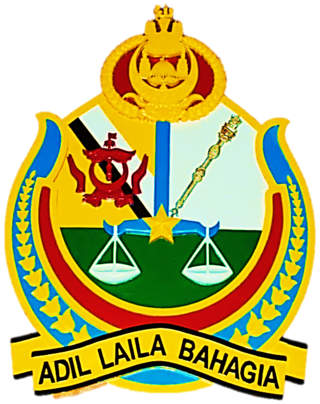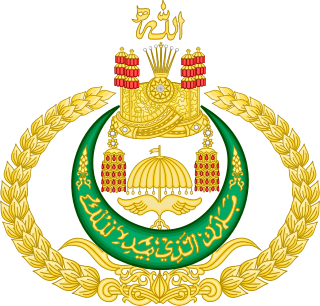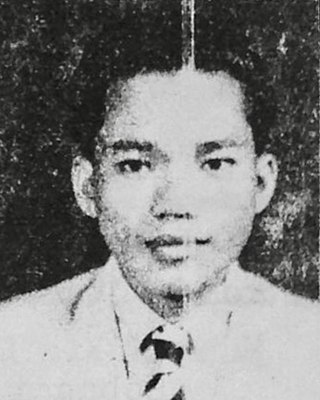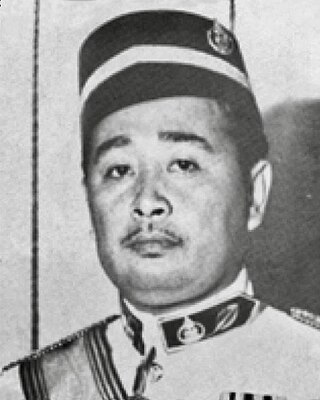
The Legislative Council of Brunei is a national unicameral legislature of Brunei. The council comprises 36 appointed members, that only has consultative tasks. Under Brunei's 1959 constitution, His Majesty Hassanal Bolkiah is the head of state with full executive authority, including emergency powers since 1962. The Council holds its sitting annually in March at the Legislative Council Building in Bandar Seri Begawan.

The prime minister of Brunei is the head of government of Brunei. Concurrently, the title is held by the sultan of Brunei, who as sultan is also the head of state of the country. As the prime minister, the Sultan and Yang Di-Pertuan is the head of both the ministerial cabinet and the Legislative Council of Brunei.
Melayu Islam Beraja was officially proclaimed as the national philosophy of Brunei on the day of its independence on 1 January 1984 by Sultan Hassanal Bolkiah.

The Council of Cabinet Ministers is the body of high-ranking Brunei officials, consisting of the top leaders of the executive branch of Brunei government. Led by the Sultan himself, who has also been the Prime Minister of Brunei since 1984.
The constitution of Brunei states that while the official religion is the Shafi'i school of Sunni Islam, all other religions may be practiced "in peace and harmony." Apostasy and blasphemy are legally punishable by corporal and capital punishment, including stoning to death, amputation of hands or feet, or caning. Only caning has been used since 1957.

Hassanal Bolkiah ibni Omar Ali Saifuddien III is Sultan of Brunei since 1967 and the prime minister of Brunei since independence from the United Kingdom in 1984.

The Constitution of Brunei was created in 1959. Ultimate authority rests with the Sultan, who is both head of state and head of government. In 2004 the Sultan approved a number of amendments to the constitution, including provision for a partially elected Legislative Council. As of 31 December 2018, elections had not been held.

The Most Blessed Order of Setia Negara Brunei, also translated as The Most Blessed Order of Loyalty to the State of Brunei, is an order of Brunei Darussalam. It was established on 29 November 1959 by Sultan Omar Ali Saifuddien III.

The Most Honourable Order of Seri Paduka Mahkota Brunei, also translated as The Most Honourable Order of the Crown of Brunei, is an order of Brunei Darussalam. It was established on 1 March 1954 by Sultan Omar Ali Saifuddien III.
The Most Eminent Order of Islam Brunei, also translated as The Most Illustrious Islamic Religious Order of the State of Brunei, is an order of Brunei. It was established on 1 August 1968 by Sultan Hassanal Bolkiah for service in the propagation, preservation and strengthening of the Islamic religion.

The Prime Minister's Office is the leading and largest cabinet-level ministry in the government of Brunei. It serves as the immediate office of the country's prime minister, as well as oversees several key government departments. It was established immediately upon Brunei's independence on 1 January 1984, with Hassanal Bolkiah, the current Sultan of Brunei, being the first and only Prime Minister to date. The leadership also consists of a Senior Minister, introduced in 2005 and has since been held by the Crown Prince Al-Muhtadee Billah, a Special Advisor to His Majesty, as well as in-house ministers and deputy ministers.

Pengiran Anak Kemaluddin Al-Haj was a nobleman, politician and teacher from Brunei who previously served as the Speaker of the Legislative Council, Member of the Privy Council, and the head of the Department of Religious Affairs. He was the founder of several Arabic schools. The institutions included the Seri Begawan Religious Teachers College, the Raja Isteri Pengiran Anak Damit Girls' Secondary Arabic Religious School, and the Hassanal Bolkiah Boys' Arabic Secondary School.

Mohammad Jamil Al-Sufri bin Umar, pen name Wijaya, was a nobleman, historian and teacher from Brunei who previously served as a member of the Royal Council, member of the Royal Succession Council, member of the Islamic Religious Council, and member of the Privy Council. He has also been referred to as the National Historian. He wrote works on the country's history, ancestry, customs and traditions, royal titles, Malay Islamic Monarchy (MIB), education, writings on Brunei heroes, and other topics.

The Privy Council is a formal body of advisers to the monarch of Brunei. When His Majesty appoints people to posts with traditional ranks, titles, and honours, the council provides advice. The council was established in 1959 in accordance with Brunei's constitution, and are in charge of advising His Majesty the Sultan and Yang Di-Pertuan of Brunei Darussalam on the three branches of government which are the executive, judicial, and legislative, even though they have separate powers. This is in keeping with the Malay Islamic Monarchy (MIB) philosophy of the country.

Dato Seri Setia Dr. Haji Abdul Aziz bin Haji Umar, also sometimes referred to as Pehin Abdul Aziz Umar, is a Bruneian nobleman and politician whom had a wide range of positions in the Government of Brunei. Before to that, he served as the Minister of Communications, the Minister of Education, and the Minister of Health. His last position was as Minister of Education, which he held from 1988 until 24 May 2005. He served in the civil service beginning with his first appointment in 1964 and held a number of roles from that time until Brunei's independence in 1984, including acting Chief Minister.

Mohammad Zain bin Serudin, pen name Shukri Zain, is a Bruneian nobleman, politician and poet who formerly held the position of Minister of Religious Affairs from 1986 to 2010. He has traveled abroad and made significant literary contributions to Malay-Islamic literature, including Islamic poetry and usage of his own Malay language to convey his poetic ideas. He also was the leader or president of the Brunei Youth Council (BYL), and a member of the Privy Council.

Dato Paduka Seri Setia Ustaz Haji Badaruddin bin Haji Othman, pen name Badaruddin H.O., is a nobleman, politician and diplomat from Brunei who currently serves as the Minister of Religious Affairs (MoRA) since 2015. He also formerly held the position of Minister of Home Affairs (MoHA) from 2010 to 2015. Within the limited group of political leaders, Pehin Abdul Aziz bin Umar and Pehin Badaruddin were regarded as the two primary proponents of the Melayu Islam Beraja (MIB) philosophy and the heads of the more orthodox Islamic faction.

Yahya bin Ibrahim, pen name Yahya M.S., was a nobleman, poet and politician from Brunei who served as the Deputy Minister of Religious Affairs from 1986 to 2005, and the Chief Syar’ie Judge. He had a career in the government service of Brunei, in which he held a number of important positions such as being a member of the Privy Council of Brunei. Additionally, he was considered one of the first to write Islamic poetry in the country.

Abdul Hamid bin Bakal was a Bruneian nobleman and Muslim scholar who held several high-ranking and important positions in the Government of Brunei.

The Jabatan Adat Istiadat Negara is a government department under the Prime Minister's Office that functions to guarantee the constant maintenance of Royal Customs. It has been translated literally as the Office of State Customs, the Department of the State Customs or the State Department of Customs and Traditions, even though it does not have an English name. In order to guarantee that the practice and implementation, particularly the Istiadat Diraja, are always in accordance with the philosophy of Melayu Islam Beraja, preaching and teaching the public through lectures, briefings, and workshops on Adat Istiadat (Customs) are regularly held.
















